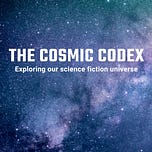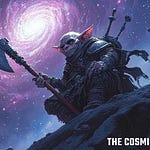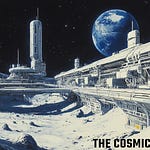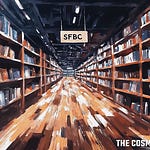My novelette, An Illicit Mercy, is part of a new promotion in December, Journey Into the New World.
Check out nearly 45 novels, short stories, and excerpts, available for free.
Customer service is the most important thing these days—for humans and robots. The best ways to deliver great customer service is to know your product and all the ways it can be programmed, maintain a positive attitude, respond quickly, and focus support on the customer.
This is especially important when you're in the business of contributing to other people's families and unfortunately, and is regardless of whether or not you think the customer is worthy of your product...
Luckily, most of the robots we sell go to wonderful customers like Mrs. Borel. It means the days I have to deal with the Mrs. Vickers of the world are rare...
Get your FREE copy of Exchange Policy by Adeena Mignogna today!
Club Codex is reading and discussing the Locus Award-winning novel “Dreams Bigger Than Heartbreak” by Charlie Jane Anders through December 31. Please join us!
By Brian Scott Pauls, with the assistance of GPT-4
“Time…is what keeps everything from happening at once.”
—The character of the Big Business Man in the short story “The Girl in the Golden Atom” by Ray Cummings (1919)
Time is an enigmatic and fundamental aspect of our universe. It has long fascinated both scientists and philosophers. Time underpins our daily experiences and stands as a cornerstone of physics. As a result, the nature of time is the subject of considerable debate. Leading theories strive to demystify the nature of time. They examine various interpretations and implications in the realms of physics and beyond.
Science fiction features many stories exploring the phenomenon of time:
The Time Machine by H. G. Wells (1895)
This classic novel introduces us to an unnamed protagonist, "the Time Traveller." He invents a time machine and travels far into the future. In the year 802,701, he discovers two distinct species. The Eloi are a gentle and passive group living above ground. The Morlocks are a more sinister and industrial population dwelling underground. Wells’ novel explores themes of class division and potential consequences of human evolution. Even further into the future, the Time Traveller witnesses the dying Earth. Moved by this sight, he reflects on the transient nature of humanity and the planet.
Kindred by Octavia Butler (1979)
Butler has created a unique blend of science fiction and historical narrative. The story follows Dana, an African-American woman from 1976. By some unknown method, she time travels to early 19th-century Maryland. There she meets her ancestors: a white slave owner and a black freewoman. Dana repeats this transition several times. Each time, the slave owner, Rufus, is in life-threatening danger. The novel examines the complexities of slavery and racial tension. Dana's experiences force her to confront harsh realities about her heritage. And the reader to confront the harsh realities of slavery in America.
Slaughterhouse-Five by Kurt Vonnegut (1969)
This story intertwines elements of science fiction with the horrors of World War II. The protagonist, Billy Pilgrim, becomes "unstuck in time." He experiences moments of his life out of sequence. These include his time as a prisoner of war in Dresden and periods of his post-war life in the United States. Billy also finds himself abducted by aliens from the planet Tralfamadore. They display him in a zoo. The novel's unconventional structure reflects the disjointed and traumatic nature of war memories. It delves into themes of free will, fatalism, and the nature of human existence.
Classical Theories of Time
Newtonian Time
Sir Isaac Newton's interpretation of time set the stage for classical mechanics. He envisioned time as an absolute, immutable entity. Newton believed it flowed at a uniform pace throughout the universe. In his view, time is independent of the observer and the universe's physical processes.
Relativity of Time
Albert Einstein's theory of relativity shifted our understanding of time. He proposed space and time as linked to form spacetime. His theory claims time is a relative phenomenon, not a universal constant. It maintains time can dilate or contract depending on various factors. These include the observer's velocity and the gravitational influence of massive objects. Relativity introduced a dynamic aspect to time. This was a marked contrast to the static, absolute time of Newtonian physics.
Block Universe Theory
The Concept of the Block Universe
Block universe theory, also known as eternalism posits that past, present, and future events are equally real. The universe is a four-dimensional block where time is another dimension, like space. All moments in time exist simultaneously.
Implications of the Block Universe
The block universe theory challenges our everyday understanding of time. It suggests that our perception of time as a flowing sequence of events is an illusion. In this framework, events we perceive as 'past' or 'future' are as real as the present moment. This has profound implications for physics.
Eternalism in the Philosophy of Time
Eternalism vs. Presentism and the Growing Block Universe
Eternalism posits a timeless existence of all moments. Presentism holds that only the present is real. Growing block universe theories assert the reality of the past and present. But the future isn't real until it becomes the present, then the past.
The Debate over Time and Existence
Eternalism raises questions about existence and our experience of time. It challenges the common human experience of a moving present.
Quantum Mechanics and Time
Time in Quantum Mechanics
Quantum mechanics, the cornerstone of modern physics, offers a different perspective on time. Time often assumes the role of a static backdrop, like Newtonian time.
The Problem of Time in Quantum Gravity
Integrating time into quantum gravity is a significant challenge in theoretical physics. The search continues for a unified theory reconciling quantum mechanics with general relativity. The nature of time is a crucial, yet unresolved, element in this quest.
Thermodynamic and Entropic Time
The Arrow of Time
The concept of the arrow of time is linked to the second law of thermodynamics. This is the law of increasing entropy. It posits that the total entropy, or disorder, in the universe tends to grow over time. This growth toward disorder imparts a direction to time itself.
Time's Relation to Entropy
We see the irreversible nature of time in phenomena like melting ice, or perfume's diffusion in a room. These processes also involve increasing entropy. This relationship links the flow of time to the universe's evolving thermodynamic state. It connects the microcosmic scale of atoms to the macroscopic progression of time.
Emergent Theories of Time
Time as an Emergent Phenomenon
Emergent theories propose a radical idea. Time may be a secondary property. It may arise from more fundamental, timeless laws of physics. This doesn't view time as an intrinsic element of the universe. It is rather a phenomenon manifesting from more basic interactions.
Loop Quantum Gravity and Time
The theory of loop quantum gravity suggests an intriguing possibility. Space-time itself might consist of tiny quantized elements. Propositions like this aim to bridge the gap between quantum mechanics and general relativity. They also offer novel insights into the possible nature of time.
Speculative and Philosophical Theories
Time in Multiverse Theories
In multiverse theories, time takes on new possibilities. These ideas posit the existence of many universes. Each could include different temporal dimensions or laws. Understanding time might call for a perspective from outside our universe.
Philosophical Perspectives
Philosophy and science often intersect in the study of time, offering complementary viewpoints. Philosophy delves into subjective experience, temporal perception, and time's relation to human consciousness. It enriches scientific theories with deeper, existential insights.
From the absolute time of Newton to Einstein's relativistic time. From the thermodynamic arrow of time to the emergent theories of modern physics. Our understanding of time has undergone profound transformations. Each theory contributes a unique piece to the puzzle. Our picture reveals time as a multifaceted, complex aspect of the universe.
The quest to understand time is captivating and challenging. The ongoing debate and research encompass a wide array of theories. Each offers insights and raises new questions.
As we look to the future, the study of time promises to remain at the forefront of scientific exploration. It seems we need an interdisciplinary approach between physics, philosophy, and other fields. This journey is about understanding both our universe and our place within it.
Story possibilities
Science fiction has not yet exhausted the riches of time as a narrative theme. Here are some examples:
Echoes of Tomorrow
Quantum computing produces a device capable of receiving messages from the future. At first, it's for scientific advancement. But the device soon reveals messages warning of a global catastrophe. A brilliant but reclusive scientist must unravel the mystery behind these messages. They discover a web of paradoxes and ethical dilemmas surrounding time manipulation. The novel examines determinism, the butterfly effect, and the moral complexities of changing historical events. The protagonist faces a choice: alter the course of history, or let the future play out as foretold.
Chrono Divergence
In the distant future, humanity has commercialized and regulated time travel. This story follows a time travel guide leading tourists on excursions into history. A temporal anomaly occurs during an expedition to witness a pivotal historical moment. The group becomes stranded in an alternate timeline. In this parallel universe, history has taken a different course. The protagonist and their group must navigate an unfamiliar world. Altered historical figures and events present them with both practical and moral challenges. Can they survive and return to their own timeline?
The Last Cycle
A researcher discovers we are living through the end of a time loop. His theory shows history will restart and repeat itself exactly as before. He teams up with an historian possessing extensive knowledge of past cycles. Their goal is to break the cycle and save the universe from eternal recurrence. The two embark on a journey through different eras. They encounter various versions of society and technology. A shadowy organization pursues them, desiring to maintain the cycle for their gain. The novel combines elements of adventure, mystery, and philosophical inquiry. It explores the nature of time, destiny, and the human capacity for change.
Do you have thoughts on the nature of time and how science fiction has explored it? Please share!
















